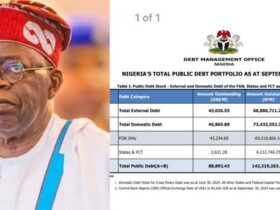Industry key player and CEO of Rainoil Limited, Gabriel Ogbechie, has claimed that the federal government has resumed the payment of the controversial fuel subsidy following the devaluation of the Naira in the foreign exchange market.

Ogbechie made this statement on Tuesday during the Stanbic IBTC Energy and Infrastructure Breakfast Session held in Lagos.
He pointed out that with Nigeria’s daily fuel usage at 40 million liters and the foreign exchange rate at N1,300, the government’s subsidy per liter of fuel falls between N400 and N500, culminating in a monthly total of approximately N600 billion.
He revealed a systematic breakdown of his assertion. In his words, “When Mr. President came May last year, one of the things he said is that Subsidy is gone. And truly subsidy was gone because immediately the price of fuel moved from 200 to 500 per liter. At that point truly, subsidy was gone.
“During that period, Dollar was exchanging for N460, but a few weeks later, the government devalued the exchange rate. And Dollar moved to about N750. At that point, subsidy was beginning to come back.
READ MORE: Hoodlums Attack LG Secretariat in Ekiti
“The moment the two markets officially closed, officially the market went to about N1,300. At that point, that conversation was out of the window. Subsidy was fully back on petrol. If you want to know where petrol should be, just look at where diesel is. Diesel is about N1,300 and petrol is still selling for N600.”
“So I can tell you for free that there there is at least N400 or N500 liters subsidy on petrol today. If you look at our daily consumption, say 40 million liters, and we’re spending N500 per liter, that is about N20 billion every day, N600 billion every month and 7.2 trillion yearly depending on how we look at it. So, subsidy is definitely back on petrol”, he added.
He further revealed that NNPC being the only petrol importer in the country implies that there is an ongoing subsidy, as prices had to be fixed.









Leave a Reply